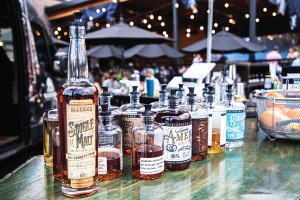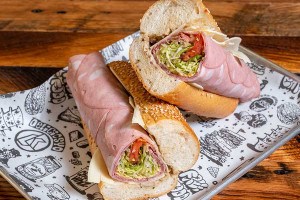Tableside Trends: Buttering Up!
 We think a lot about butter — a lot, like maybe as much as other people think about their children — and we’re particular about how it’s served to us in restaurants alongside our bread. At the very least it should be room temperature, so that it’s easy to spread. It’s also a bonus if it’s salted (because when you’re indulging in delicious butter, it’s really not the time to be worrying about your sodium levels). The very best butters offer something else: a pronounced flavor, just shy of cheesy, a luscious texture, and creamy mouthfeel. Recently, we came across two butters that really rocked — churned? — our world: a rich and golden French butter at South Philly BYO Bibou and an unusual butter made from goat’s milk at Lombard Street seafood restaurant Fish.
We think a lot about butter — a lot, like maybe as much as other people think about their children — and we’re particular about how it’s served to us in restaurants alongside our bread. At the very least it should be room temperature, so that it’s easy to spread. It’s also a bonus if it’s salted (because when you’re indulging in delicious butter, it’s really not the time to be worrying about your sodium levels). The very best butters offer something else: a pronounced flavor, just shy of cheesy, a luscious texture, and creamy mouthfeel. Recently, we came across two butters that really rocked — churned? — our world: a rich and golden French butter at South Philly BYO Bibou and an unusual butter made from goat’s milk at Lombard Street seafood restaurant Fish.
Fish chef-owner Mike Stollenwerk tells us he was looking for an out-of-the-ordinary butter to serve at his Rittenhouse restaurant and was introduced to the goat’s milk butter through a dairy purveyor. Stollenwerk was sold after trying the delicate, pale white butter, which comes from Meyenberg Goat Products in Turlock, California, “It’s very light and tangy,” he says, “the higher acidity of the goat’s milk makes it a great match for seafood.” He’s been trying to find a closer source for goat’s milk butter, but hasn’t found anyone in the tri-state area who has undertaken the project — it seems that making goat’s milk butter is a more labor-intensive process than cow’s milk butter. It’s also difficult to cook with (it doesn’t respond to heat well) and it’s pricey — Stollenwerk says Meyenberg’s goat’s milk butter costs him close to $8 a pound.
Over at Bibou, owners Pierre and Charlotte Calmels, both natives of France, serve their bread with dainty foil-wrapped wheels of luscious Echire salted butter imported from Normandy. If you’re thinking these are wan little rectangles of flavorless dairy product, think again. Charlotte Calmels tells us it gets its wonderful texture from its higher fat content (“I looked it up,” she says, “French butter has more calories than American butter.”) and its full flavor from whatever magical grasses those French cows are grazing on, plus the salt. “It does exist in an unsalted version, which we only have tried because there was a shipping mistake.” says Calmels, who says she even cooks with salted butter at home. Not the Echire butter though — Di Bruno Brothers imports it for Bibou and it rings in at a whopping $13 a pound. Which makes getting it for free as part of complimentary bread service seem like quite a deal.
Bibou, 1009 South 8th Street; 215-965-8290
Fish, 1708 Lombard Street; 215-545-9600
*Photo Credit: EssjayNZ via Flickr


